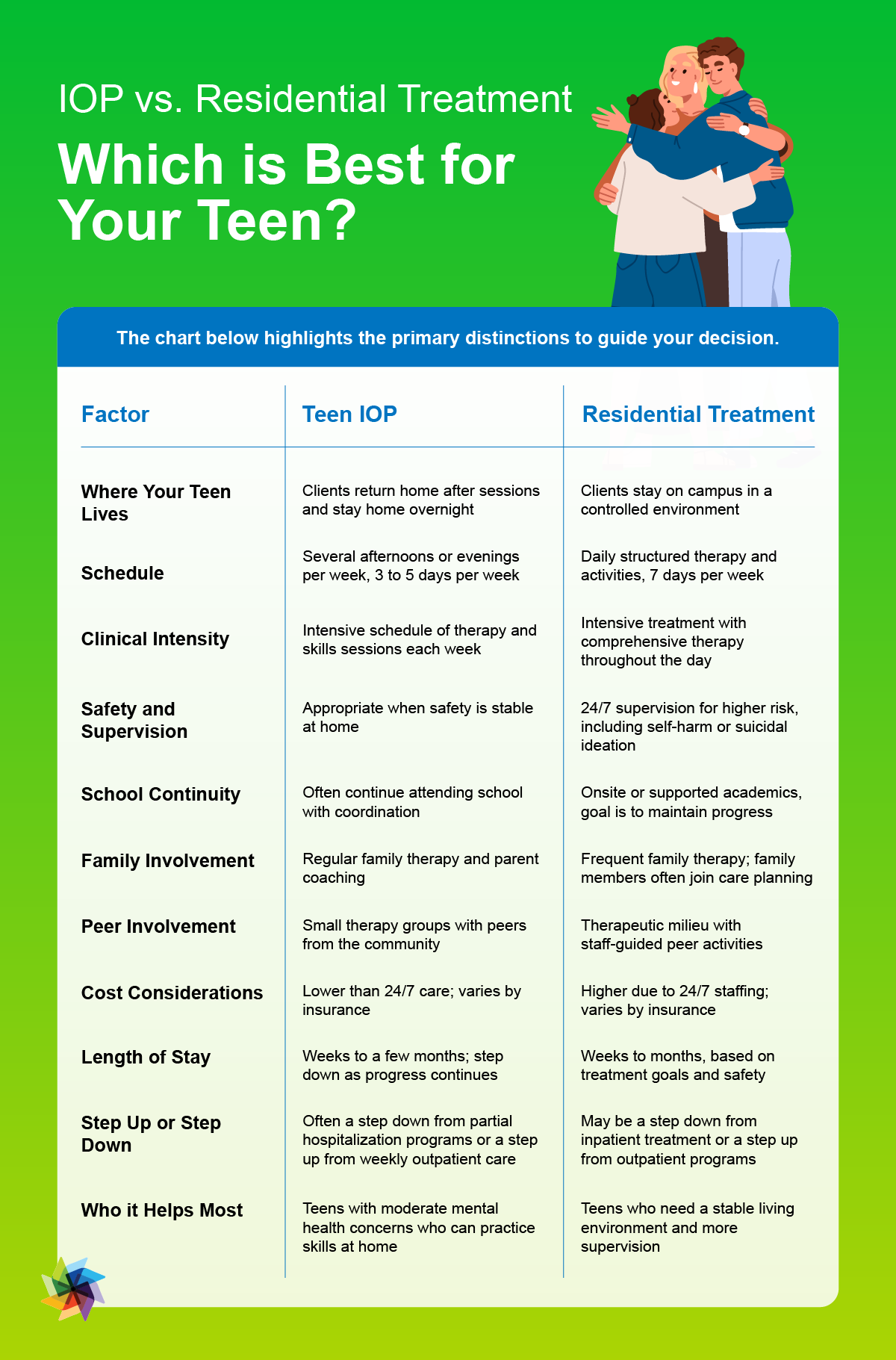Choosing the right level of mental health care for your teen can feel overwhelming. This guide explains IOP vs. residential treatment for teens in Los Angeles so you can make a confident, informed decision.
HillsidesCares provides specialized adolescent mental health care in Los Angeles County. If you are weighing options, our team can help you compare programs and understand the next step.
What is a mental health intensive outpatient program (IOP)?
An IOP is a form of structured outpatient treatment that offers more support than weekly therapy, without 24/7 care. In a typical intensive outpatient program, teens attend treatment 3 to 5 days a week, for 3 to 4 hours each day. Many families choose an IOP because it allows teens to live at home, continue attending school, and practice coping skills in daily life.
What IOP usually includes:
- Clinical assessment and individualized planning services
- Individual therapy sessions at least once per week
- Group therapy and skills groups several times per week
- Family therapy to strengthen communication and support
- Psychiatric evaluation and medication management when needed
- Safety planning, relapse prevention plans for substance use as appropriate, and crisis response
Who IOP often helps:
- Teens with moderate mental health concerns, such as anxiety, depression, or mood disorders that affect school and home life
- Teens who need more than weekly therapy, but who are safe to return home after each session
- Teens stepping down from higher levels of care, such as partial hospitalization or residential care
At HillsidesCares, our adolescent intensive outpatient program supports teens who benefit from a structured schedule and strong family involvement.
What is residential treatment for teens?
Residential treatment, sometimes called inpatient treatment, provides 24/7 care in a therapeutic, controlled environment. In teen residential treatment, clients stay on campus with nursing and staff supervision. Days include structured therapy, education support, and recreational activities designed to help teens stabilize, build coping skills, and safely practice new healthy behaviors with continuous support.
What residential treatment usually includes:
- Comprehensive therapy (individual and group therapy, family therapy, and skills training)
- 24/7 supervision for safety concerns, including self-harm or suicidal ideation
- Medication evaluation and close monitoring by mental health professionals
- Education coordination to support academic progress while in care
- Therapeutic support for co-occurring mental health disorders or substance use
Residential treatment is recommended when a teen needs a stable living environment and a higher level of care than outpatient programs can provide. Length of stay varies based on progress, often longer than outpatient treatment, and is determined by the treatment team and family.
HillsidesCares offers residential treatment for teens with intensive therapy, strong family involvement, and a supportive environment designed for adolescent needs.
Key differences: schedule, care, and support
Parents often ask about the main difference between IOP and residential programs. The biggest differences involve where your teen lives, the intensity of clinical care, the level of supervision, and how treatment fits with school and family life. The comparison below can help you understand teen IOP vs. residential care at a glance.

If your teen can safely return home after sessions and is ready to practice new skills in real life, an IOP may fit. If your teen needs continuous monitoring or has significant functional impairment, residential treatment may be the appropriate level.
Which level of care is right for my teen?
There is no one-size-fits-all answer. The appropriate care level depends on many factors, including safety, diagnosis, daily functioning, school attendance, family support, and previous response to treatment programs.
When IOP is a good fit | When residential treatment is a better fit |
Safety is stable at home; no current plan or intent for self-harm | Safety concerns require 24/7 supervision, such as recent suicide attempt, suicidal ideation with plan, or repeated self-harm |
Symptoms are moderate but hindering daily life, such as anxiety or depression affecting grades or sleep | Severe functional impairment, school refusal, unsafe peer group, or inability to maintain safety overnight |
Your teen can attend several sessions per week and the family can support structure at home | Co-occurring conditions require more intensive therapy, such as trauma with panic attacks or substance use alongside a mental health condition |
Your teen is stepping down after residential treatment or partial hospitalization | You’ve already tried outpatient programs without seeing improvement |
A licensed clinician should conduct a clinical assessment to recommend the right program.
IOP vs. residential FAQs
Where do PHP and inpatient care fit?
Partial hospitalization, also called day treatment, provides full day care without overnight stays. It is more intensive than IOP and less than residential. Explore our partial hospitalization program if your teen needs a full day of care while returning home each night.
Although “inpatient” and “residential” are sometimes used interchangeably, full inpatient treatment programs are hospital-based and are the highest level of care. They stabilize severe risk over a few days when safety is urgent, such as active suicidal ideation or severe addiction withdrawal symptoms, and may include medical detox for substance use.
Is IOP enough for anxiety or depression?
Often yes, for teens with moderate symptoms who can engage in therapy, attend school, and use coping strategies at home. IOP combines individual therapy, group therapy, and family therapy, along with psychiatric care when needed. For severe depression with high risk, residential or inpatient treatment is safer.
Is IOP the same as rehab?
Not exactly. IOP is a level of care, and there are IOPs for mental health and for addiction treatment. If a teen has substance use concerns with withdrawal symptoms, medically supervised detox may be needed before outpatient treatment. Detox typically occurs in inpatient programs or inpatient rehab, not in IOP. HillsidesCares focuses on adolescent mental health treatment and can coordinate with community resources in Pasadena or LA when addiction treatment is indicated.
Should I do IOP or PHP?
If your teen needs more structure than IOP offers, but does not require overnight care, a partial hospitalization program can be a strong middle step. Many families step down from inpatient care to PHP, then to IOP, then to weekly outpatient treatment as progress continues.
If your teen is in immediate danger, call 911 or go to the nearest emergency department. For urgent mental health support, you can also call or text 988 for the Suicide and Crisis Lifeline.
Los Angeles options: why location matters
If you’re deciding between IOP and residential treatment in Los Angeles County, here are some location factors to consider:
- School continuity and district coordination: Staying local helps teens keep pace with their schoolwork. Make sure your program can coordinate with Los Angeles schools to support attendance, assignments, and accommodations.
- Commute and scheduling: Traffic can affect daily routines. An IOP with afternoon or early evening hours can fit around school and activities, while minimizing commute stress.
- Family involvement: Evidence shows family involvement supports better outcomes. Being close to home makes it easier to attend family therapy and parent coaching sessions.
- Cultural fit and community: Los Angeles County is diverse. Look for programs with experience serving your family’s community and language needs. Feeling understood helps teens engage in treatment.
- Step-down planning: If your teen needs to transition programs over time, it is helpful to choose a treatment center that offers multiple levels of care, such as residential treatment, partial hospitalization, and outpatient programs. This continuity supports a smoother recovery journey.
HillsidesCares provides a continuum of adolescent care in Los Angeles County, including teen residential treatment and IOP. Our programs emphasize family therapy, structured skills practice, and collaboration with schools to support attending school during or after treatment as appropriate.
How treatment works across levels of care
Regardless of the level of care, effective adolescent mental health treatment shares common elements:
- Evidence-based therapies, such as CBT and DBT skills, delivered in individual and group therapy
- Family support to improve communication and reduce conflict
- Medication evaluation and monitoring by mental health professionals when appropriate
- Skills practice and coping strategies for mental health triggers at home and school
- Aftercare planning to help teens return home or transition to the next level of care with the right supports
For teens with co-occurring substance use, treatment programs often integrate relapse prevention and coordination with addiction treatment. When detox is required, inpatient care may be necessary before stepping into outpatient programs or less intensive residential treatment.
Conclusion: choosing between IOP and residential in Los Angeles
The choice between IOP vs. residential treatment for teens in Los Angeles comes down to safety, symptom severity, and how much structure your teen needs to succeed. IOP works well for moderate concerns when home is safe and stable. Residential treatment provides 24/7 support for teens who need a higher level of care and a structured living environment to make progress.
HillsidesCares is here to partner with your family, answer your questions, and help you decide the right program and next steps. Reach out to us today to get started.

